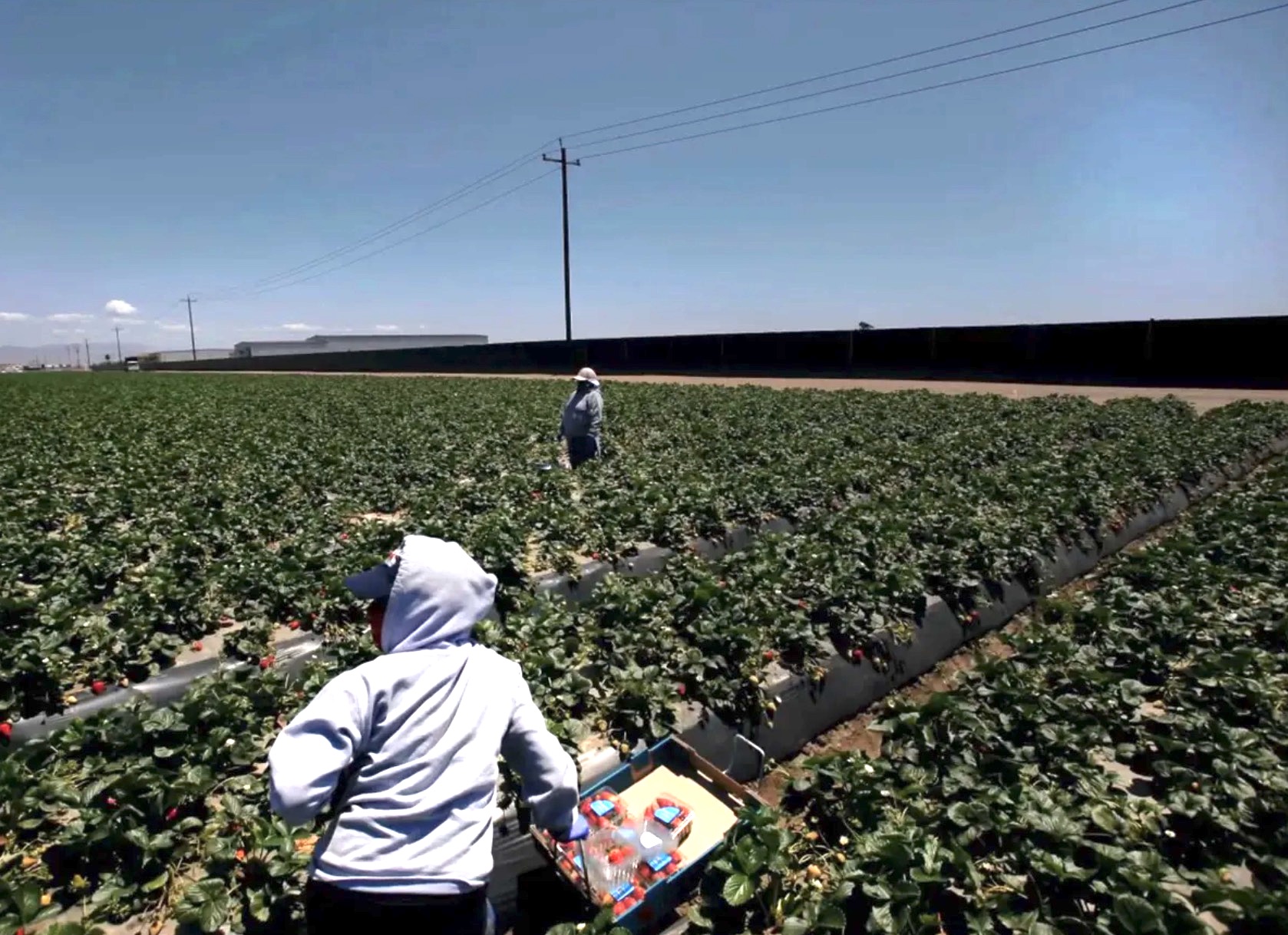Santa Barbara County Takes Step Toward Addressing Farmworker Conditions
Supervisors Tread Lightly as Farmworkers and Farmers Debate $26 Minimum Wage

During last week’s heat wave, when some families were trying to beat the heat at home or headed to the beach to cool off, Santa Barbara County farmworkers were under the sweltering sun, working for hours in the fields to ensure that food was still available for our fridges, pantries, and beach-day picnics.
At Tuesday’s Board of Supervisors hearing, farmworker advocates shared the struggles of underpaid ag-workers, and farmers warned of impacts of higher wages, as the county considered forming a committee to discuss a potential living wage ordinance for farmworkers.
Daniel Segura, an organizer with Central Coast Alliance United for a Sustainable Economy (CAUSE), said that the move would be a “crucial step to formally begin discussing” the concerns raised by farmworkers. The ad hoc committee, which was suggested after dozens of workers and advocates came to highlight the issue during a previous board meeting, has already ignited a firestorm debate — with workers pushing for a $26 minimum wage while farmers and business groups warn the county that a higher minimum wage would come with dire unintended consequences.
“Farmworkers and their families have been filled with hope at the message that our elected officials are hearing their voices,” Segura said.
The struggles of farmworkers were laid out in Harvesting Dignity: The Case for a Living Wage for Farmworkers, a report that details the stagnant wages and extreme working conditions endured along the Central Coast, which is the nation’s number-one source of strawberries.
“Extreme heat is just one example of hazardous working conditions for farmworkers,” Segura said. “Let’s ensure that we’re thinking of lives and livelihoods as these conversations begin, and not just profits.”
But even the idea of the county discussing a higher minimum wage for workers was enough to rustle up a wave of criticisms from farmers and growers associations, including Growers-Shippers Association President Claire Wineman, who said during public comment that the formation of an ad hoc subcommittee would be equal to the county “providing implicit endorsement” of an unsustainable minimum wage. She suggested the idea be “rejected outright.”
Supervisor Bob Nelson made similar comments, saying that the committee would “send a signal that there is policy movement toward a living wage,” and that, if a committee should be formed at all, the discussion should be broadened to take away focus from the polarizing “nuclear option” of a $26 minimum wage.
Supervisors Das Williams and Joan Hartmann, who both asked that the item be placed on the agenda for board discussion, were open to widening the scope of the committee, though they were adamant that the county should continue looking into the concerns of farmworkers.
“This is a request from the public, from people that are legitimately hurting,” Supervisor Williams said. “I am not going to close my ears to their pleas — they deserve to be heard.”
Williams said that he understood that debate over a higher wage for workers could make people “amped up and angry,” and agreed to the suggestion to continue the formation of the committee but with a change in the name of the group from the “Living Wage Ad Hoc Committee” to the “Farmworker Conditions Ad Hoc Committee,” with discussions opened to wages, workplace conditions, and employee housing.
The board unanimously approved the motion, with Supervisors Williams and Hartmann to sit on the committee, and Supervisor Nelson to replace Williams after his departure early next year.
Premier Events
Sat, Dec 21
11:00 AM
Santa Barbara
Mosaic Makers Market – Holiday Weekend Market
Sun, Dec 22
11:00 AM
Santa Barbara
Mosaic Makers Market – Holiday Market Finale
Wed, Dec 25
6:00 PM
Santa Barbara
FREE Contra Dance X-mas Day💃Corwin & Grace band6-9
Sat, Dec 21
11:00 AM
Santa Barbara
Mosaic Makers Market – Holiday Weekend Market
Sat, Dec 21
12:00 PM
Santa Barbara
Gift Wrapping with Life Chronicles
Sat, Dec 21
2:00 PM
Santa Barbara
State Street Ballet’s 30th Anniversary Production of ‘The Nutcracker’
Sat, Dec 21
4:00 PM
Santa Barbara
Wine + Painting Workshop
Sat, Dec 21
5:00 PM
Santa Barbara
The Rhythm Industrial Complex: Live at Fox Wine Co
Sat, Dec 21
5:00 PM
Santa Barbara
LET IT GLOW Winter Solstice on State St.
Sat, Dec 21
5:15 PM
Santa Barbara
The Longest Night Memorial
Sat, Dec 21
5:30 PM
Santa Barbara
First United Methodist Church Living Nativity
Sat, Dec 21
6:00 PM
Santa Barbara
Captain Fatty’s Ugly Xmas Sweater Party
Sat, Dec 21
6:30 PM
Santa Barbara
Ugly Sweater Singles 30s and 40s Party!
Sat, Dec 21 11:00 AM
Santa Barbara
Mosaic Makers Market – Holiday Weekend Market
Sun, Dec 22 11:00 AM
Santa Barbara
Mosaic Makers Market – Holiday Market Finale
Wed, Dec 25 6:00 PM
Santa Barbara
FREE Contra Dance X-mas Day💃Corwin & Grace band6-9
Sat, Dec 21 11:00 AM
Santa Barbara
Mosaic Makers Market – Holiday Weekend Market
Sat, Dec 21 12:00 PM
Santa Barbara
Gift Wrapping with Life Chronicles
Sat, Dec 21 2:00 PM
Santa Barbara
State Street Ballet’s 30th Anniversary Production of ‘The Nutcracker’
Sat, Dec 21 4:00 PM
Santa Barbara
Wine + Painting Workshop
Sat, Dec 21 5:00 PM
Santa Barbara
The Rhythm Industrial Complex: Live at Fox Wine Co
Sat, Dec 21 5:00 PM
Santa Barbara
LET IT GLOW Winter Solstice on State St.
Sat, Dec 21 5:15 PM
Santa Barbara
The Longest Night Memorial
Sat, Dec 21 5:30 PM
Santa Barbara
First United Methodist Church Living Nativity
Sat, Dec 21 6:00 PM
Santa Barbara
Captain Fatty’s Ugly Xmas Sweater Party
Sat, Dec 21 6:30 PM
Santa Barbara

























